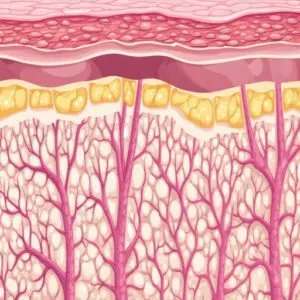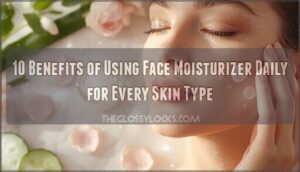This site is supported by our readers. We may earn a commission, at no cost to you, if you purchase through links.

The epidermis and dermis layers rely on sunscreen, hydration, and gentle cleansers to stay strong and youthful, while keratin proteins act like armor, keeping your skin resilient and waterproof.
Don’t forget the hypodermis, your skin’s cushiony underlayer—it loves a healthy diet, plenty of water, and rest.
Eating vitamin-rich foods, especially ones with vitamin C and omega-3s, can fuel that natural glow.
And daily moisturizers and SPF? They’re a must.
Curious about keeping wrinkles and blemishes at bay? There’s more science-backed advice where this came from.
Table Of Contents
- Key Takeaways
- Skin Structure Explained
- Nutrition for Healthy Skin
- Essential Skin Care Routine
- Managing Skin Concerns
- Maintaining Youthful Skin
- Frequently Asked Questions (FAQs)
- What is good skin care?
- Are there any foods that are generally good for our skin?
- How can i Improve my Skin Health?
- How can I keep my skin healthy and young-looking?
- What is good skin care & why is it important?
- What should I consider when taking care of my Skin?
- What is a good skin routine for women?
- How can I improve my skin health?
- What is the No. 1 brand recommended by dermatologists?
- What vitamins should women take for skin?
- Conclusion
Key Takeaways
- Protect your skin daily with sunscreen (SPF 30+), hydrate consistently, and use gentle products to maintain a healthy barrier.
- Eat nutrient-rich foods like salmon, avocados, and leafy greens, and stay hydrated to give your skin the glow it craves.
- Get quality sleep to support skin repair and avoid stressors like inflammatory foods or harsh cleansers to prevent damage.
- Incorporate vitamin C, omega-3s, and antioxidants into your routine to boost collagen, smooth wrinkles, and fight free radicals.
Skin Structure Explained
Your skin is more than a protective layer—it’s made up of three hardworking layers, each with a unique role.
Understanding how the epidermis, dermis, and hypodermis function can help you care for your skin like a pro.
Epidermis and Dermis Layers
Your skin’s structure relies on two heroes: the epidermis and dermis.
The epidermis, your barrier against the world, repels damage and supports cell turnover.
Below it, the dermis provides collagen structure and dermal thickness, keeping skin firm.
Prioritize these layers with smart choices:
- Protect the barrier with sunscreen.
- Hydrate to support dermis elasticity.
- Avoid harsh cleansers.
Importance of Keratin Proteins
Ever wonder why your skin doesn’t just crumble under pressure?
That’s keratin holding it all together.
It’s the protein powerhouse that reinforces your skin barrier, keeping it waterproof and resilient.
Think of keratin as the bricks in a sturdy wall, shielding you from harm.
Keratin Benefits
| How It Helps |
|---|
| Waterproofing |
Role of Hypodermis in Skin Health
Think of the hypodermis as your skin’s cozy underlayer—it’s all about fat storage, insulation, and cushioning.
This layer provides shock absorption and structural support, keeping your skin barrier intact.
For women’s skin health, proper care helps this layer stay balanced, and a healthy diet, hydration, and consistent skin care help the hypodermis protect and maintain overall skin health.
Maintaining good skin texture habits is also vital for the overall health of the hypodermis and skin.
Nutrition for Healthy Skin
What you eat shows up on your skin, so focusing on nutrient-rich foods is a smart move.
Vitamins, healthy fats, and hydration fuel your skin’s natural glow and keep it looking its best.
Benefits of Vitamin C and Omega-3
You’ve looked in the mirror and thought, “How do I keep this glow?”
Start with vitamin C and omega-3 fatty acids.
These skin-boosting allies:
- Brighten skin and help with collagen production.
- Smooth wrinkles and support skin firming.
- Reduce sun damage with antioxidant effects.
- Soothe dry, itchy skin and improve elasticity.
Maintaining healthy skin also involves understanding the gut skin connection to achieve superior results.
Your skin’s two best friends!
Importance of Hydration and Sleep
Skipping proper water intake habits leaves your skin shouting for help—dryness, dullness, and those dreaded fine lines follow.
Hydration tips? Keep a water bottle handy and munch on water-rich foods.
Sleep patterns matter, too—poor rest messes with your skin rejuvenation cycle.
Give yourself the gift of glowing skin through consistent hydration and quality sleep. It’s simple—moisture and rest!
Impact of Diet on Skin Health
What you eat shows on your skin—it’s like a mirror of your diet.
To boost skin health, follow these tips:
- Avoid inflammatory foods like sugary snacks and fried meals.
- Eat nutrient-dense options like fatty fish and leafy greens.
- Prioritize gut balance with probiotics.
- Watch for food allergies affecting skin.
- Stay hydrated for proper nutrient absorption.
A healthy skin diet should include foods rich in omega 3 fatty acids to reduce inflammation and promote overall skin wellness.
Essential Skin Care Routine
Keeping your skin healthy doesn’t have to feel overwhelming—start with a simple routine that works.
Gentle cleansing, daily moisturizing, and trusty sunscreen are the basics your skin will thank you for every day.
Choosing Gentle Cleansers and Moisturizers
Don’t overcomplicate your womens skincare routine; start with gentle skin care basics.
Choose a cleanser free from harsh chemicals and a moisturizer suited to your skin type.
Sensitive skin women? Go fragrance-free.
Natural products can help, but read labels carefully.
These skincare products women love keep things balanced, making your sensitive skin glow without irritation.
Using a gentle facial cleanser is essential for maintaining healthy skin.
Cleanser Benefits
| Moisturizer Types | |
|---|---|
| Removes dirt, oil, and makeup | Lightweight gels for oily |
| Prevents clogged pores |
Importance of Sunscreen and SPF
A strong skincare routine doesn’t stop at cleansing and moisturizing—it includes sun protection.
Daily sunscreen is your shield against UV rays, sun damage, and skin cancer.
Remember these SPF benefits:
- Use SPF 30+ for maximum defense against UV damage.
- Broad-spectrum sunscreens protect both aging (UVA) and burning (UVB).
- Reapply every two hours for consistent coverage.
Protecting your skin with a proper skin care routine is essential for preventing long-term damage and signs of aging.
Exfoliation and Skin Care Frequency
You’ve nailed sunscreen, so now let’s talk exfoliation.
Gentle exfoliation techniques keep skin renewal on track, clearing out buildup for that glow.
Overdo it, though, and you’ll irritate your skin.
Once or twice a week is plenty for most.
Mix it into your skin care routine, follow with a moisturizer, and consider product rotation to match your skin’s needs.
Using the right exfoliating skin products can help maintain a balanced skin care routine.
Managing Skin Concerns
In terms of tackling common skin concerns like acne, dryness, or hyperpigmentation, it’s all about using the right products and keeping your routine simple.
By understanding your skin type and addressing its specific needs, you can keep issues in check and enjoy healthier, happier skin.
Addressing Acne and Hyperpigmentation
If breakouts leave behind dark spots, you’re not alone.
Acne treatment starts with tackling skin inflammation—think niacinamide, azelaic acid, or retinoids.
Hyperpigmentation causes, like hormonal acne, can worsen without daily SPF.
To brighten uneven tone or scars, women’s skin health benefits from AHAs, vitamin C, or in-office treatments like chemical peels.
Sunscreen is your best ally! Effective acne treatment cream options can also help reduce inflammation and prevent future breakouts.
Strategies for Oily and Dry Skin
Dealing with oily or dry skin? Find your happy skin balance with these simple tips:
- Oily skin care: Use a lightweight gel moisturizer, avoid over-washing, and focus on oil regulation to keep that shine under control.
- Dry skin remedies: Stick to lukewarm water, apply moisturizer while damp, and skip harsh cleansers.
- Skin pH balance: Choose gentle, pH-balanced products for better moisture control.
Understanding the importance of an anti aging routine can substantially impact the overall health and appearance of your skin.
Concerns for Combination and Sensitive Skin
Sensitive skin care means embracing balance, especially with combination skin.
Stick to fragrance-free alternatives and gentle product reviews before trying anything new.
Tackle skin pH balance with creamy cleansers for dryness and aloe vera for irritation.
Women’s skin health thrives on lightweight serums, hydrating masks, and sunscreen.
Remember, less is more when calming sensitive skin concerns.
Test products to stay safe!
Maintaining Youthful Skin
You can keep your skin looking youthful by giving it the nutrients and care it needs to stay strong and healthy.
Simple steps like using antioxidants, eating healthy fats, and protecting against sun damage go a long way in preventing wrinkles and keeping your skin glowing.
Role of Antioxidants and Vitamins
Boosting your skin’s glow starts from within.
Vitamins and antioxidants fight off free radicals, keeping your skin healthy and vibrant.
Here’s your cheat sheet for radiant skin:
- Vitamin C: Collagen booster and brightener.
- Vitamin A: Repairs damage and smooths texture.
- Antioxidants: Protect cellular health daily.
- Skin Nutrients: Include leafy greens for natural defense.
Benefits of Healthy Fats and Amino Acids
Healthy fats, like those in avocados or nuts, keep your skin soft and hydrated, while Omega-3 sources—think salmon or flaxseeds—support firmness by strengthening cell walls.
Amino acids are the unsung heroes for women’s skin health, powering nutrient absorption and boosting skin repair.
Together, these nutrients work like your skin’s armor, locking in moisture and helping it bounce back beautifully.
Incorporating natural skincare routines that emphasize natural anti aging benefits can further enhance skin health and overall appearance.
Preventing Premature Aging and Wrinkles
Regarding preventing premature aging, don’t skip UV protection—sunscreen is your skin’s best friend.
This simple step, combined with retinoids for boosting collagen stimulation, which also improve skin texture, is crucial for skin health.
Stress management plays a huge role too; cortisol can fast-track wrinkles, making it an important aspect of skincare.
Smart lifestyle choices, like quality sleep and antiaging skincare for women, keep skin aging in check while maintaining a radiant glow.
Frequently Asked Questions (FAQs)
What is good skin care?
Think of your skin like a loyal friend—it thrives on simple, consistent care.
Cleanse gently, moisturize daily, and wear sunscreen religiously.
Skip the 10-step routines; healthy skin loves balance, protection, and hydration.
Are there any foods that are generally good for our skin?
Add these to your plate: salmon for omega-3s, avocados for healthy fats, and spinach for vitamins.
Toss in some berries for antioxidants and nuts for selenium.
Your skin will thank you—inside out!
How can i Improve my Skin Health?
You wouldn’t patch a sinking ship with duct tape, so don’t neglect your skin’s foundation.
Eat nutrient-packed foods, stay hydrated, use sunscreen daily, and stick to a simple routine with gentle, effective products.
How can I keep my skin healthy and young-looking?
Stay youthful by using SPF daily, hydrating like it’s your job, and eating skin-loving foods like salmon and avocados.
Toss in gentle cleansing, moisturizer, and sleep—your skin will thank you with a glowing smile.
What is good skin care & why is it important?
Let’s cut to the chase—good skin care protects from damage, keeps you glowing, and delays signs of aging.
It’s like tending a garden: consistent effort with the right “tools” guarantees lasting beauty and health.
What should I consider when taking care of my Skin?
Start with the basics: cleanse gently, moisturize daily, and wear SPF 30+.
Stay hydrated, eat nutrient-rich food, and get quality sleep.
Avoid harsh products, pick routines for your skin type, and listen to your skin’s needs.
What is a good skin routine for women?
Cleanse gently morning and night, hydrate with a lightweight moisturizer, and always slap on SPF 30+.
Exfoliate weekly for glow-up vibes.
Add vitamin C for brightness and retinol at night to slow aging. Done!
How can I improve my skin health?
Drink more water, eat colorful veggies, and swap sugary snacks for nuts.
Use sunscreen daily, moisturize, and simplify your skincare routine.
Sleep well—it’s like a reset button for your skin.
Don’t overcomplicate it!
What is the No. 1 brand recommended by dermatologists?
You don’t have to reinvent the wheel—CeraVe is often the dermatologist’s top pick.
It’s gentle, effective, and affordable.
Bonus points for their no-fuss formulas packed with ceramides to keep your skin barrier happy and healthy.
What vitamins should women take for skin?
You’ll want vitamin C for collagen boost, E for repair, A for cell turnover, D for healing, zinc for repair, and omega-3s for hydration.
Think of these as your skin’s dream team!
Conclusion
Isn’t glowing, healthy skin worth a few simple changes?
Whether it’s protecting your epidermis with SPF, fueling your dermis with vitamin-rich foods, or hydrating that cushiony hypodermis layer, it’s all connected.
Sticking to a consistent routine, using gentle products, and getting enough rest are game-changers.
Remember, your diet, sleep, and smart product choices directly impact skin health for women, so take control, show your skin some love, and enjoy that radiant complexion you deserve!
- https://www.lorealparisusa.com/beauty-magazine/skin-care/skin-care-concerns/skin-problems-guide
- https://www.statista.com/statistics/1334325/most-common-skin-concerns-among-us-skin-care-shoppers-by-generation/
- https://www.aad.org/media/stats-numbers
- https://www.healthline.com/health/beauty-skin-care/skin-care-tips
- https://www.reddit.com/r/SkincareAddiction/comments/32yged/how_much_time_do_you_spend_on/












